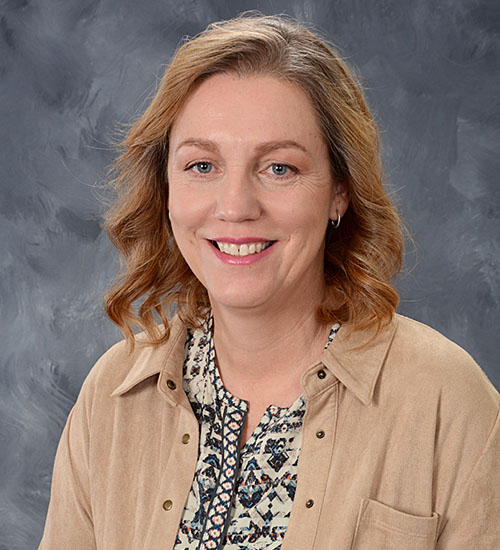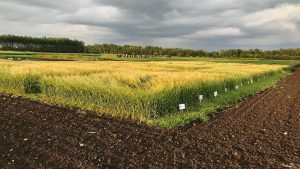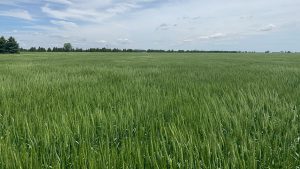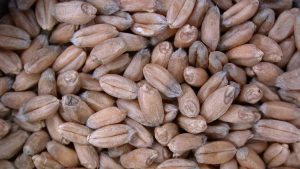New future for Ontario wheat breeding
VACANT PROFESSORSHIP FILLED by dr. helen booker
WORKING ON A product that farmers will actually use is important to Dr. Helen Booker. She has already registered seven new flax cultivars during her career; and she now hopes to continue that success with a different crop — wheat.

Booker has been named to the Grain Farmers of Ontario Professorship in Wheat Breeding position within the Department of Plant Agriculture at the University of Guelph.
The Professorship was created in 2013 through a $1-million investment by Grain Farmers of Ontario, SeCan, and the Ontario Agricultural College, with the intent to drive development of well-adapted, improved wheat varieties for Ontario’s grain farmers. The role combines research in plant breeding and genetics and teaching undergraduate and graduate level courses.
Booker previously led the Flax Genetics and Breeding Program at the University of Saskatchewan. She attained her Ph.D. in plant sciences from the University of West Indies, St. Augustine, Trinidad and received both her M.Sc. and B.Sc. from the University of Guelph.
“I’m pleased to have the opportunity to move back to Ontario and work in a breeding program in an academic setting,” says Booker. “Training and teaching students are rewarding experiences.”
While she officially starts her new role on September 1, Booker has been working over the summer as a research scientist, managing the University of Guelph Wheat Breeding Program. This has given her the opportunity to get a sense of what plant material is currently in the program and see the material in the field.
Booker already has a long list of wheat production issues she would like to address with her breeding efforts — including winter survival, yield stability, and breeding for disease resistance (such as Fusarium Head Blight, powdery mildew, and stripe rust). She hopes to apply genomics and marker development to help support her breeding efforts, as well as double haploid breeding to develop winter wheat cultivars in fewer generations.
She hopes to utilize the Canadian Winter Wheat Diversity Panel, in part developed by members of the Guelph Wheat Breeding Program, as a starting point for disease resistant traits in an adapted background. “Plant breeders are always capitalizing on our colleagues’ successes, so we look first to the adapted material and make improvements on that, and perhaps if you can’t find good resistance in the adapted material then we need to look a little further afield,” explains Booker.
Booker hopes she can also broaden her opportunities for collaboration with others within the faculty of Plant Agriculture. “I’m looking forward to working with my colleagues at Guelph,” she says, noting some ideas such as research on Fusarium Head Blight on all cereals, is a good opportunity to collaborate.
She is grateful the faculty at Guelph supported the Wheat Breeding Program while the Professorship position was vacant after the passing of Dr. Ali Navabi in March 2019. “He did a lot of work to start the program off on a good footing. I respect that work,” says Booker. “I want to uphold Ali’s legacy and also develop my own.”
“Helen has demonstrated a strong track record of effectively applying her breeding expertise to various crops and developing commercially-relevant varieties for farmers. We are excited to begin working with her to develop improved wheat varieties for Ontario’s farmers.”
“Helen has demonstrated a strong track record of effectively applying her breeding expertise to various crops and developing commercially-relevant varieties for farmers. We are excited to begin working with her to develop improved wheat varieties for Ontario’s farmers.” – Crosby Devitt, CEO, Grain Farmers of Ontario.
“At SeCan we’ve had the pleasure of working with Helen for many years as flax breeder at the University of Saskatchewan’s Crop Development Centre. Helen has demonstrated her technical abilities as a breeder, and her leadership with a team of professionals to develop products that meet the needs of industry.” – Jeff Reid, general manager, SeCan.
“This is a key position for our department, the University, and Ontario grain farmers. I am so pleased to welcome Helen back to Guelph. I know her expertise in plant breeding and her talent for developing successful commercial varieties will bring considerable value to our students and industry stakeholders.” – Professor Hugh Earl, chair of the Department of Plant Agriculture, University of Guelph.
This article features a research initiative of Grain Farmers of Ontario. •


























